Be sure to Click LIKE at the bottom of this article, and share it everywhere!! By Craig Andresen – The National Patriot and Right Side Patriots – Commentary
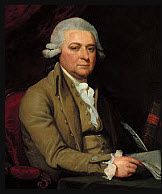 On July 4th, we celebrate our nation’s birth and this year, 2020, it will be the 244th time we have done so but that date, while by no means suspect, should be seen in context. One of our founders thought the celebration would occur on a different date and he, in no uncertain terms, put it in writing using the social media of the day.
On July 4th, we celebrate our nation’s birth and this year, 2020, it will be the 244th time we have done so but that date, while by no means suspect, should be seen in context. One of our founders thought the celebration would occur on a different date and he, in no uncertain terms, put it in writing using the social media of the day.
The date was July 1st, 1776 when John Adams, a prolific letter writer and a visionary founder of our nation penned a letter to his wife Abigail Adams, in which he made what at the time was a series of bold predictions.
“The second day of July, 1776, will be the most memorable epoch in the history of America. I am apt to believe that it will be celebrated by succeeding generations as the great anniversary festival. It ought to be commemorated as the day of deliverance, by solemn acts of devotion to God Almighty. It ought to be solemnized with pomp and parade, with shows, games, sports, guns, bells, bonfires, and illuminations, from one end of this continent to the other, from this time forward forever more.”
Adams missed the mark by 2 days, believing that the day the document was presented to the Continental Congress, not the day it would be adopted, would be the celebratory day, but this excerpt from a simple letter offers much more, I believe, than a 48 hour premature pronouncement of celebration.
That letter, I submit, is a look behind the scenes and provides a fresh look at how one of our founders perceived the moment.
I’ll return to this letter after a look at the historical context which encouraged Adams to put his pen to parchment.
In 1774, the first Continental Congress was formed as delegates went to Philadelphia. 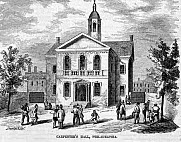 Those delegates, from all 13 colonies, while agonizing over England’s control, were not of a mind yet to commit to war. They were a year away and a few major events from that position.
Those delegates, from all 13 colonies, while agonizing over England’s control, were not of a mind yet to commit to war. They were a year away and a few major events from that position.
At the same time, the Continental Congress was taking upon itself the duties of a national government and had already established its own currency, an army of sorts and a postal entity. The Privateering Resolution, in the early spring of 1776, allowed the colonists “to fit out armed vessels to cruize [sic] on the enemies of these United Colonies.” This, in effect, established the American Navy…a navy of privateers or…pirates…for lack of a better term.
When England sent their army to take Concord, Paul Revere made his famous ride of warning and with the “shot heard around the world” fired in 1775, the war for independence was officially begun but still, delegates from what was now the 2nd Continental Congress preferred diplomacy over war and to that end they attempted in futility to change the course of England’s iron control over the colonies.
By early June, 1776, independence was the cry and delegates had made their decision. Richard Henry Lee, on June 7th, while standing in what is now Independence Hall read a proclamation stating, “Resolved: That these United Colonies are, and of right ought to be, free and independent States, that they are absolved from all allegiance to the British Crown, and that all political connection between them and the State of Great Britain is, and ought to be, totally dissolved.”
The delegates were divided and Congress went into a 3 week recess to allow the delegates to fully consider their votes. It was then that what may well be the most astute committee in history, a committee of five men, John Adams, Benjamin Franklin, Robert R. Livingston and Roger Sherman, and chaired by Thomas Jefferson was formed to draw 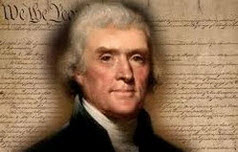 upon their wisdom and write a formal declaration.
upon their wisdom and write a formal declaration.
Jefferson later wrote of the process, that the other 4 committee Members, “unanimously pressed on myself alone to undertake the draught [sic]. I consented; I drew it; but before I reported it to the committee I communicated it separately to Dr. Franklin and Mr. Adams requesting their corrections. . . I then wrote a fair copy, reported it to the committee, and from them, unaltered to the Congress.”
In this short note, written by Jefferson, is contained further valuable insight into the mind and vision of John Adams to which I will also return.
On July 2nd, 1776 the document was considered and through the morning of July 4th, slight revisions were made. By late in the morning of July 4th, the Declaration of Independence had been formally adopted.
Of the 56 names signed to the document, only 2 signed on July 4th 1776, those being John Hancock and Charles Thomson. Most of the rest signed nearly a month later on August 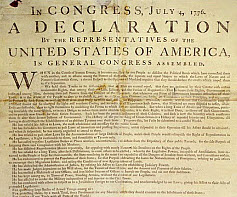 2nd and the last to sign was Thomas McKean who had left to join Washington’s army and did not until 5 years later realize he had forgotten to add his signature. Aside from Hancock and Thomson, the names of the signers was held in secret for more than a year as substantial rewards had been offered by the Crown for these men of history as they were considered to be traitors.
2nd and the last to sign was Thomas McKean who had left to join Washington’s army and did not until 5 years later realize he had forgotten to add his signature. Aside from Hancock and Thomson, the names of the signers was held in secret for more than a year as substantial rewards had been offered by the Crown for these men of history as they were considered to be traitors.
Now, back to the letter Adams penned to his wife. In his time, the writing of letters was the equivalent of today’s social media.
“The second day of July, 1776, will be the most memorable epoch in the history of America. I am apt to believe that it will be celebrated by succeeding generations as 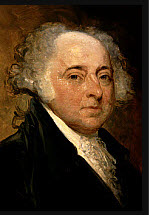 the great anniversary festival. It ought to be commemorated as the day of deliverance, by solemn acts of devotion to God Almighty. It ought to be solemnized with pomp and parade, with shows, games, sports, guns, bells, bonfires, and illuminations, from one end of this continent to the other, from this time forward forever more.”
the great anniversary festival. It ought to be commemorated as the day of deliverance, by solemn acts of devotion to God Almighty. It ought to be solemnized with pomp and parade, with shows, games, sports, guns, bells, bonfires, and illuminations, from one end of this continent to the other, from this time forward forever more.”
I believe the date of July 2nd, mentioned by Adams was a rare reflection of profound excitement in that he believed that the date on which the document was presented would be the date of its future celebration instead of the date upon which it was adopted. I believe also that we can forgive his exuberance, but this letter shows more…much more.
What this letter shows is what Adams clearly knew to be the heart and resolve of a new nation. In stating the day would be celebrated by “succeeding generations” is testament to his profound vision that despite the staggering odds, America would defeat the British and win independence from them.
John Adams believed that the holiday celebrating our nation’s birth should include… pomp and parade, with shows, games, sports, guns, bells, bonfires, and 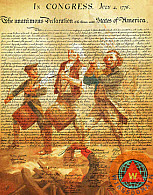 illuminations, an uncanny and accurate prediction of the way we celebrate Independence Day every year…but there is more…
illuminations, an uncanny and accurate prediction of the way we celebrate Independence Day every year…but there is more…
Adams ends this excerpt from the letter to Abigail with what may well be the MOST profound statement of all…” from one end of this continent to the other, from this time forward forever more.”
From one end of this continent to the other.
From the time of this statement in writing, it would be 28 years before Lewis and Clark would journey, at the direction of President Thomas Jefferson, to the west coast across more than half an unknown and unsettled continent from one end to the other. Clearly others had seen the “other end” of the continent but not Americans, yet Adams knew, in 1776, that we would.
Adams and his visionary pronouncement allowed for this nation to grow, settle and expand past the known. It allowed for the winning of the revolutionary war and the war of 1812 when the British would attempt to regain custody of America. It would allow for the challenge of civil war and 2 world wars. It would allow too for the addition of 37 more states.
Adams knew intuitively that our Nation, our grand experiment would survive. He knew that despite differences, this nation would be celebrated not just by those who gave it life but by 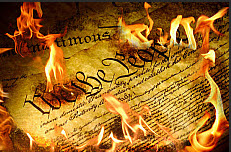 all generations later to come.
all generations later to come.
It is both safe and accurate to say that now, some 244 years later, our constitution is under attack from within. The differences of political opinion have some believing that the constitution is a thing of the past and no longer viable. To their ends, they would impose upon the citizens many of the same ideas from which we declared our independence in 1776 and therefore, I contend, our Declaration of Independence also is under attack.
Okay, now let’s look again at that note penned by Jefferson when he wrote that the other 4 men on the esteemed committee “unanimously pressed on myself alone to 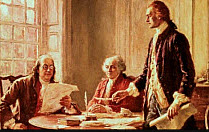 undertake the draught [sic]. I consented; I drew it; but before I reported it to the committee I communicated it separately to Dr. Franklin and Mr. Adams requesting their corrections. . . I then wrote a fair copy, reported it to the committee, and from them, unaltered to the Congress.”
undertake the draught [sic]. I consented; I drew it; but before I reported it to the committee I communicated it separately to Dr. Franklin and Mr. Adams requesting their corrections. . . I then wrote a fair copy, reported it to the committee, and from them, unaltered to the Congress.”
The insight penned here, into John Adams, is nearly hidden but none the less, remarkable.
While the committee included Adams, he and Jefferson were not friends. Their differences were political and at the time, on nearly opposite ends of the spectrum. While Adams and Jefferson were in accord on the founding of our nation the two had little use for one another after that and became bitter political rivals rarely speaking to each other. That Adams would be in total, “unanimous” agreement that his opposite should be the one to write the Declaration of Independence, speaks volumes. That Jefferson would seek the approval of Adams before introducing the declaration to the Continental Congress is telling of the regard each had for the other.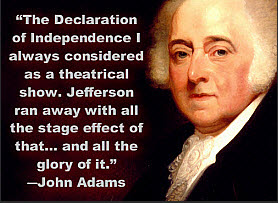
Jefferson most likely was seen as the intellect and Adams…the conscience and both of them realized that while on opposite ends of politics, the founding of a nation meant to survive for all time, would require both men’s talents from the onset. In this regard, despite their divide, the two were bound together for all time.
Adams and Jefferson both died, somehow appropriately, on the 50th anniversary of our nation’s founding, July 4th, 1826. Adams did not know, in the late afternoon of his last day, that Jefferson had died just hours before and after making his last toast to our most celebrated day, Adams uttered his final words, filled with disdain, in regard to his fellow visionary. “Jefferson survives.”
As we make plans for the celebration of the 4th of July with family and friends…celebrations which are sure to include, “pomp and parade, with shows, games, sports, guns, bells, bonfires, and illuminations..” why not set aside a moment, somewhere 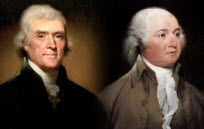 amid the fun, to propose the toast that Adams gave just hours before his death?
amid the fun, to propose the toast that Adams gave just hours before his death?
So, what was that last toast?
“Independence Forever!”
-John Adams July 4th, 1826
Copyright © 2018 Craig Andresen / thenationalpatriot.com all rights reserved
*************************************************************************************************
For more political commentary please visit my RIGHT SIDE PATRIOTS partner Diane Sori’s’s blog The Patriot Factor to read her latest article On The Birth Of Our Nation
*************************************************************************************************
RIGHT SIDE PATRIOTS…LIVE!
Tomorrow, Friday, July 3rd from 7 to 8:30pm EST, RIGHT SIDE PATRIOTS Craig Andresen and Diane Sori discuss ‘On The Birth Of Our Nation’; ‘Independence Forever’; ‘The Intellect and Conscience of Independence’;and give their predictions on what will happen this July 4th weekend.
Hope you can tune in at: https://streamingv2.shoutcast.com/right-side-patriots
Radio link goes live at 6:45pm EST.





Craig, this was an amazing history lesson!!!! Ya’ll did great!!! What was even more surprising was your writing about….”Most of the rest signed nearly a month later on August 2nd and the last to sign was Thomas McKean who had left to join Washington’s army and did not until 5 years later realize he had forgotten to add his signature. Aside from Hancock and Thomson, the names of the signers was held in secret for more than a year as substantial rewards had been offered by the Crown for these men of history as they were considered to be traitors.” I have been stumped for months on my Ancestry….and you just unraveled my problem…Thomas McKean…………the man who who brought his family here and from him came my Father’s people through marriage which ultimately led to the birth of my great great grandfather on my Dad’s side!!! I love this!!! Thanks for the great history lesson!!! 🙂
Again, another History lesson to enlighten the population of the truths, and will of our our founders that we shall adhere to for the love of our FREEDOMS bestowed upon us. Great job Craig and Diane!!
A remarkable commentary and you and Diane should be commended “with pomp and circumstance!” As a kid, I never really paid attention to history, and thanks to you, I have more knowledge than I did concerning our Independence Day. I had heard in a college history class, that John Adams was really the man who wrote the Declaration of Independence. He had a hand in it, but he only really acted as a “technical writer.” However, I have always considered all of the Continental Congress members to be so very brave. God bless them, and God bless us!
Thank you Craig and Diane for a super history lesson! You rock!